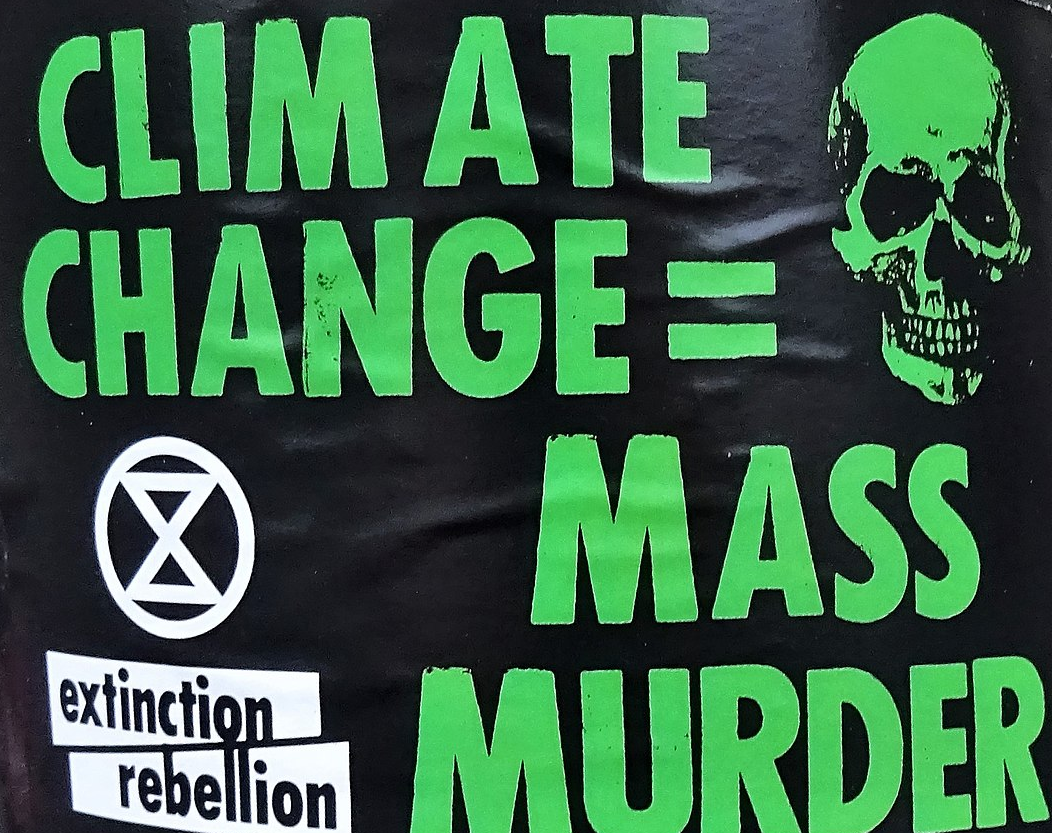
Climate crisis: Is it time to charge Big Oil with homicide?
A new academic study, accepted for publication in Harvard Environmental Law, asks the pertinent question about Big Oil and climate change: “Given the extreme lethality of the conduct and the awareness of the catastrophic risk on the part of fossil fuel companies, should they be charged with homicide?”

C: Extinction Rebellion
We have known for seventy years that smoking and cancer have a causal link. And yet, unbelievably, in many countries, there has still been no successful litigation against Big Tobacco for its decades-long campaign of denial, delay, and death. There are no Big Tobacco executives behind bars. They knowingly killed their consumers, but they walk free.
Just as Big Tobacco has killed tens of millions of people, it has been estimated that climate change could be responsible for an estimated five million deaths a year. Fossil fuels are the primary driver of our warming planet. But despite this, although Big Oil bosses kill millions, they too walk free.
Hardly a day goes by without another climate-related disaster, yet the culprits for this crisis are not being held accountable for the deaths they cause. Although there is increasing litigation against the fossil fuel industry, including for defrauding investors and racketeering, the industry has never been sued for homicide relating to climate change.
A new academic study, accepted for publication in Harvard Environmental Law, points out that “no prosecutor in any jurisdiction is bringing homicide charges of any kind against fossil fuel companies (FFCs) for even a single death related to climate change.”
The paper asks the pertinent question: “Given the extreme lethality of the conduct and the awareness of the catastrophic risk on the part of fossil fuel companies, should they be charged with homicide?” And by homicide, they mean manslaughter or murder. It adds that the case for “homicide prosecutions is increasingly compelling.”
Homicide prosecutions for far less culpable and lethal conduct are regularly undertaken in the United States. The paper notes that if “people are regularly indicted and convicted over momentary negligence that kills a single person,” why not Big Oil, that is killing millions.
The evidence for action is overwhelming. It is not only the harm as a result of climate change but also the decades-long public relations campaign that the fossil fuel companies have employed, replicating the Big Tobacco playbook. The companies denied the evidence and delayed any action for decades. They deliberately obfuscated the science.
As the paper outlines: “Fossil fuel companies learned decades ago that what they produced, marketed, and sold would generate “globally catastrophic” climate change. Rather than alert the public and curtail their operations, they worked to deceive the public about these harms and to prevent regulation of their lethal conduct.”
Academics and activists have extensively documented the playbook over the years, with hundreds of internal documents coming to light via Congressional hearings.
As the paper outlines, “when confronted with extensive internal and external research about the grave dangers posed by their business model, they did not notify the public, regulators, or legislators, much less work to find solutions or change their business model.”
Instead, the fossil fuel companies “developed extensive disinformation and political influence campaigns to obscure the risks, confuse others, and block legal or regulatory restriction of their increasingly lethal conduct.”
Moreover, the paper contends, “while they put their wealth to work reducing regulatory and legal risks to their profit margins, they privately used the data they disputed and obscured to reduce their own exposure to climate-change-related industrial risks to further maximize their future profits.”
We know now that they knew what would happen. We know that #Exxonknew. They all knew. “Today, the climate change that they forecast has already killed thousands of people in the United States, and it is expected to become increasingly lethal for the foreseeable future,” the paper says.
Professor Donald Braman, from George Washington University and co-author of the paper, told the Guardian he believed that pursuing homicide charges would significantly impact fossil fuel companies more than the current court cases. Rather than paying a fine, homicide charges could open up an array of other outcomes that could materially alter how companies operate.
We know none of the Big Oil companies are tackling climate change seriously and radically transitioning away from oil. As a report by Oil Change International and other civil society groups outlined last year, “the climate promises of major U.S. and European oil and gas companies still fail to meet the bare minimum for alignment with the Paris Agreement.”
Although the world’s leading scientists have said we cannot carry on drilling if we want a liveable future, the largest private oil companies are involved in over 200 expansion projects, equivalent to the lifetime emissions of 77 new coal power plants. They are doing this in full knowledge of the destruction their actions will cause.
As the paper concludes: “if FFCs continue to produce, market, and sell all available fossil fuels, they will contribute to the deaths of an innumerably large number of people and render large regions of the planet unfit for human life.”
